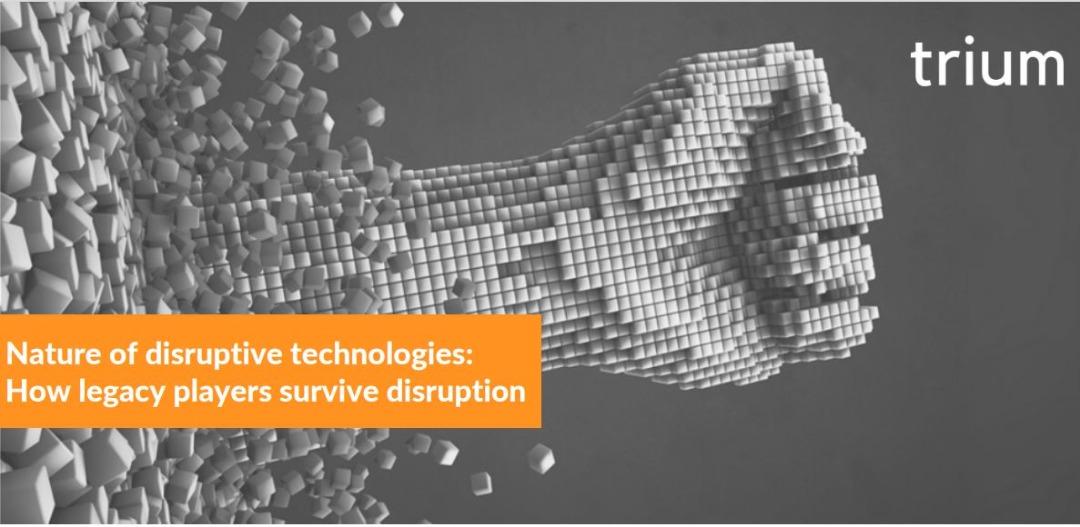Far from being disintermediated by technological disruption, legacy organizations increasingly understand how to manage and survive the impact of shifting technologies and the new organizational and consumer behaviours that they inspire. In fact, “the smart money is on legacy organizations leading the charge in adopting new technologies or partnering with disruptive start-ups to evolve their traditional businesses into high-performance fulfilment ecosystems, able to lead and win in the new economy,” says Mosa Issachar, Digital Assets Investment lead at Trium.
Trium, an SEC-registered Venture Capital Fund Manager, is a leading digital venture builder, inspired by a vision to seek out and solve challenges in Africa’s emerging and frontier markets by leveraging the transformational power of technology backed by smart capital and expertise.
The key to understanding disruption and how new technologies replace older ones is to grasp the power of exponential effects. If it were possible, for example, to fold a single sheet of paper 50 times, the first fold would be a fraction of a millimetre thick. On the 50th fold, the sheet would be about 100 million kilometres thick, about two-thirds of the distance between the Sun and the Earth. This illustrates the kind of impact that exponential trends can have on workers and businesses. It also defines what Trium means by disruption.
True disruption must have an exponential impact on a business. Despite the current hype around disruption, disruption has always been with us. In 1436 Gutenberg’s printing press disrupted the scale and speed at which information was disseminated, distributing the monopoly that the church had on the production and reproduction of books and information. This drove not only the Reformation but is very similar to countless other social, cultural economic and political shifts in Europe over 400 years.
To clearly define the nature of disruption in the current context, this article will discuss a few classifications of, specifically, technological disruption. In addition to being exponential in nature and, like the printing press, able to distribute previous monopolies;
- Disruption should challenge existing structures. Digital asset ecosystems inherently position themselves as parallel and alternate systems, not merely augment existing traditional analogue structures. Blockchain, for example, provides an entirely separate banking ecosystem in which value is not created, defined or managed by governments. In fact, on the blockchain, governments or other authorities have no power to manipulate or manage the ledger, “the fewer gatekeepers prevent or separate people from using the system the more the system increases its ability to transact” says Issachar. As such, blockchain technology represents the first real challenge to how money is created, valued, accessed and deployed since central banks began issuing national fiat, first in 11th century China and medieval Italy, and then very broadly after the world left the gold standard in the early 1970s.
- Technological disruption should also provide greater efficiency than traditional or legacy systems, eroding or replacing previously used infrastructure. As the telephone replaced the telegraph, and then the internet replaced fixed-line telephone systems, not only was the technology entirely replaced but the abilities that the disruptive technologies enabled were greater, by far than what was previously possible. In a nutshell, next-generation must offer truly significant gains. Unless the gains in efficiency, performance or ability are truly greater, expensive legacy systems are unlikely to be abandoned.
- Truly disruptive technologies also generally follow an S-shaped adoption curve, appealing first to early adopters able to recognize and deploy the value of the disruption. The exponential advantages that accrue to early adopters then inspire.
- True technology disruption is also defined by a network effect. Internet technologies, for example, increase the scale and rate of the relevance of technology adoption. Technology has made it possible for people to communicate across the world to share and network on the same global technology, language and interest platforms.
- A final defining characteristic of technological disruption is late-stage exponential growth. It took about 500 years to evolve from the printing press to the personal computer (PC). Less than 20 years from the PC to the internet. Yet the network effect of the last 20 years was exponentially greater than the preceding half millennium.
Once legacy organizations understand the nature of true technological disruption and can identify its value or potential within their businesses, the challenge then becomes how to adapt to integrate the technological disruption for growth. Trium’s own experience in building technology startups from scratch, and then setting them up as either stand-alone operations or integrating them into existing legacy businesses, provides valuable insight into how legacy businesses can leverage disruptive technology for sustainable growth. It is always prudent to “ride the wave.” This unequivocally means not positioning legacy organizations in opposition to technological disruption. Instead, organizations should seek to understand the nature of the disruption, especially how businesses can leverage the disruption to improve their own abilities.
As such, the second principle of effectively leveraging technology disruption is understanding how to redesign from the first principles. For example, by failing to understand that Napster had changed the first principles of legal copywriting and ownership, traditional music producers and marketers soon found themselves redundant in the middle of an exponentially expanded global music distribution and sales environment.
Legacy organizations should quickly integrate new technologies, wholesale. This cannot happen piecemeal or too slowly while organizations gradually phase out legacy technologies, develop or acquire new skills, or build appropriate structures. Speed of adoption and agility of adaptation is critical if legacy organizations are to successfully leverage disruption.
Furthermore, the rule of thumb for legacy organizations is the need to build new technology systems outside of legacy models. Disruptive technology should be built, tested and adopted in smaller systems “separate from the business — and then quickly deployed into the formal structure. Legacy businesses should additionally, develop a dual or multi-speed organization capable of operating different systems at different speeds and capabilities.
Additionally, it is prudent to understand, develop or employ new skill sets. While retraining is important, employing technology natives who already operate fluently in disruptive technology is key, both to instant ability and deeper organizational learning and change. Finally, legacy organizations need to be able to measure the impact of the technology they have built or adopted. Only by understanding the impact of the disruption can businesses develop products or services that exponentially improve customer experience by being more than just the sum of their parts.
Trium has developed a first-principles operating model enabled by its hands-on experience in identifying, developing or partnering with high-potential disruptive technology start-ups across Nigeria and other African emerging and frontier markets. This experience has evolved a culture at Trium which is adept at incorporating disruption into a multi-speed business culture able to understand, interpret and advise legacy organizations to access and deploy the full power of disruption.
Find out more about us here, you can also connect with us on Medium, LinkedIn and on Twitter














